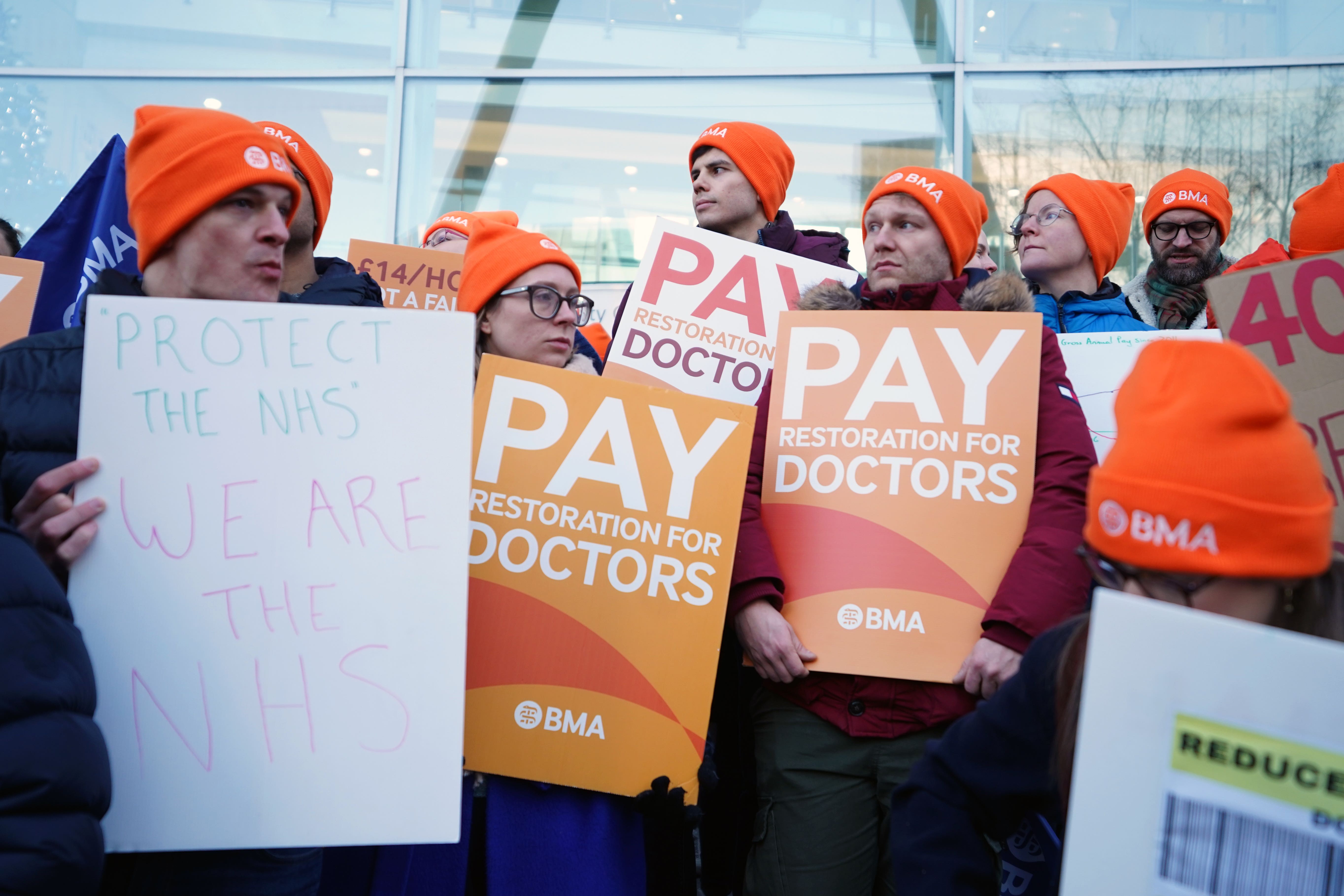We are striking because ‘there won’t be any doctors left’ – medics
Medics have spoken about the bitter pay dispute from cold picket lines.

Your support helps us to tell the story
From reproductive rights to climate change to Big Tech, The Independent is on the ground when the story is developing. Whether it's investigating the financials of Elon Musk's pro-Trump PAC or producing our latest documentary, 'The A Word', which shines a light on the American women fighting for reproductive rights, we know how important it is to parse out the facts from the messaging.
At such a critical moment in US history, we need reporters on the ground. Your donation allows us to keep sending journalists to speak to both sides of the story.
The Independent is trusted by Americans across the entire political spectrum. And unlike many other quality news outlets, we choose not to lock Americans out of our reporting and analysis with paywalls. We believe quality journalism should be available to everyone, paid for by those who can afford it.
Your support makes all the difference.Junior doctors “do not earn enough”, medics have said as they launched a fresh round of strike action in the bitter dispute over pay with the Government.
Medics described how their colleagues are “fleeing the country” and how “there won’t be any doctors left” unless pay is improved.
Doctors in training from the British Medical Association (BMA) and the Hospital Consultants and Specialists Association in England began a 72-hour strike at 7am on December 20.
Speaking on a picket line at University College Hospital in London, Dr Hamish Bain said junior doctors are leaving the NHS over the “correctible issue” of pay.
The 30-year-old told the PA news agency: “Every year there’s a pay review body that suggests increasing pay, and that increase in pay hasn’t reflected inflation and the cost of living – so in real terms our pay has been cut.
“I obviously appreciate that people are upset about missing elective appointments and outpatient appointments, but if we don’t act now then five or 10 years down the line there won’t be any doctors left and those appointments will become much worse and much longer than they are.”
Dr Vivek Trivedi, co-chair of the BMA junior doctors’ committee, said that in order to break the deadlock the Government needed to “recognise and value doctors and not inflict a real-terms pay cut”.
“What that will look like is a credible offer that can stop strikes now and forever in the future,” he told PA.
“We were in talks for the best part of a month or so and thought we were making good headway there but unfortunately by the deadline that both sides had agreed to, what they had on the table was never going to have been good enough for our members.
Asked whether he believed that junior doctors had the support of the public for the strikes, he said: “I think the public know the only way to have a healthcare system that looks after them is to have enough doctors. And they can completely appreciate when doctors graduate and they’re starting on £15.50 an hour – after the Government’s latest pay uplift – and go to a maximum of £30 an hour after 10 years of working, that’s just not enough.”
He said that the offer from the Government, an average 3% rise, would see doctors who are paid £15.50 per hour given a rise to be paid £16 per hour.
Dr Trivedi said that it was “not unreasonable” for doctors to want to be paid £21 per hour.
He added: “While strike action is disruptive, the public are still very much aware that the Government needs to get real and meet us at the table and put an offer that will end this dispute.
“That’s the only way this dispute will end – an offer that’s acceptable to our doctors which will work towards building back the value to a doctor’s life, and be able to then retain those doctors who are otherwise fleeing to places like Australia, Canada, New Zealand, Ireland – we need to do better.”
Speaking from a picket line in London Dr Sumi Manirajan, deputy co-chairwoman of the BMA’s junior doctors’ committee, said staff were “fleeing” the UK for other countries “where they’re being remunerated appropriately”.
Dr Manirajan said: “The biggest resource within the NHS is its workforce. And if you don’t pay them appropriately, they will leave or go to other countries.”
Speaking at a picket line outside University College Hospital, Dr Robert Laurenson, co-chair of the BMA’s junior doctors committee, said Health Secretary Victoria Atkins had a “much more constructive tone” than her predecessor Steve Barclay, but was “still not quite listening”.
He added: “Why are they wasting so much time? I understand that Victoria Atkins has another offer to make. So why doesn’t she just make it? Why is she letting these strikes go on?”
Junior doctors chanted “claps don’t pay the bills” as they gathered on the steps of the London hospital.
Some of those striking carried banners stating that junior doctors would move overseas unless pay was improved, with one reading: “All of my friends are in Australia.”